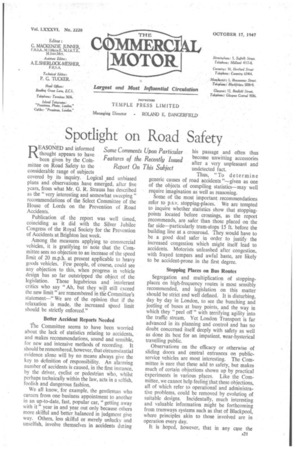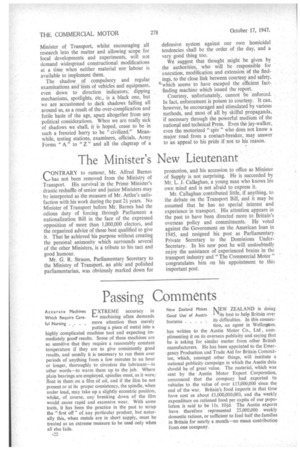Spotlight on Road Safety
Page 23

Page 24

If you've noticed an error in this article please click here to report it so we can fix it.
REASONED and informed thought appears to have been given by the Coinmittee on Road Safety to the considerable range of subjects covered by its inquiry. Logical .and unbiased plans and observations have emerged, after five years, from what Mr. G. R. Strauss has described as the "very interesting and somewhat sweeping" recommendations of the Select Committee of the House of Lords on the Prevention of Road Accidents.
Publication of the report was well timed, coinciding •as it did with the Silver Jubilee Congress of the Royal Society for the Prevention of Accidents at Brighton last week.
Among. the measures applying to commercial vehicles, a is gratifying to' note. that the Committee sees no objection to an increase of the speed limit of 20 m.p.h. at present applicable to heavy goods vehicles. Few people, of course, could see any objection to this, when progress in vehicle design has so far outstripped the object of the legislation. Those lugubrious and intolerant critics who say " Ah, but they will still exceed the new limit" are remembered in the Committee's statement—" We are of the opinion that if the relaxation is made, the increased speed limit should be strictly enforced."
Better Accident Reports Needed file Committee seems to have been worried about the lack of statistics relating to accidents, and makes recommendations, sound and sensible, for new and intensive methods of recording. It should be remembered, however, that circumstantial evidence alone will by no means always give the key to definition of responsibility. An alarming number of accidents is caused, in the first instance, by the driver, cyclist or pedestrian Who, whilst perhaps technically within the law, acts in a selfish, foolish and dangerous fashion.
We all know, for example, the gentleman who careers from one business appointment to another in an up-to-date, fast, popular car, "getting away with it" year in and year out only because others more skilful and better balanced in judgment give way. Others, less skilful or merely unlucky and unselfish, involve themselves in accidents dining his passage and often thus become unwitting accessories after a very unpleasant and undetected fact.
Thus, "To determine generic causes of road accidents "—given as one of the objects of compiling statistics—may well require imagination as well as reasoning.
Some of the most important recommendations refer to p.s.v. stopping-places. We are tempted to inquire whether statistics show that stopping. points located before crossings, as the report recommends, are safer than those placed on the far side—particularly tram-stops 15 ft. before the building line at a crossroad. •They would have to be a good deal safer in order to justify the increased congestion which might itself lead to accidents. Motorists unleashed after congestion, with frayed tempers and awful haste, are likely to be accident-prone in the first degree.
Stopping Places on Bus Routes Segregation and multiplication of stoppingplaces on high-frequency routes is most sensibly recommended, and legislation on this matter should be strict and well defined. It is disturbing, day by day in London, to see the bunching and jostling of buses at busy points, and the way in which they "peel off" with terrifying agility into the traffic stream. Yet London Transport is far advanced in its planning and control and has no doubt concerned itself deeply with safety as well as done its best for an impatient, near-hysterical travelling public.
Observations on the efficacy or otherwise of sliding doors and central entrances on publicservice vehicles are most interesting. The Committee is sure that these add to safety, but makes much of certain objections shown up by practical experiments in various places. Like the Committee, we cannot help feeling that these objections, all of which refer to operational and administrative problems, could be removed by evolutioi) of suitable designs. Incidentally, much interesting and valuable information might be forthcoming from tramways systems such as that of Blackpool, where principles akin to those involved are in operation every day.
It is hoped, however, that in any ease the Minister of Transport, whilst encouraging all research into the matter and allowing scope for local developments and experiments, will not demand widespread constructional modifications at a time when neither material nor labour is available to implement them.
The shadow of compulsory and regular examinations and'tests of vehicles and equipment, even down to direction indicators, dipping mechanisms, spotlights, etc., is a black one, but we are accustomed to dark shadows falling all around us, as a result of the over-complication and futile haste of the age, apart altogether from any political considerations. When we are really sick of shadows we shall, it is hoped, cease to be in such a frenzied hurry to be "civilized." Meanwhile, testing stations, examiners, officials, Army Forms " A " to " Z " and all the claptrap of a defensive system against our own homicidal tendencies shall be the order of the day, and a very good thing too. We suggest that thought might be given by the authorities, who will be responsible for execution, modification and extension of the findings, to the close link between courtesy and safety, which seems to have escaped the efficient factfinding machine which issued the report.
Courtesy, unfortunately, cannot be enforced. In fact, enforcement is poison to courtesy. It can, however, be encouraged and stimulated by various methods, and most of all by skilful propaganda, if necessary through the powerful medium of the national and technical Press. Even the jay-walker, even the motorized " spiv " who does not know a major road from a contact-breaker, may answer to an appeal to his pride if not to his reason.












































































